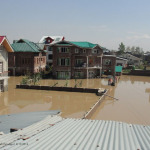Community Correspondent Arti Bai Valmiki's report got the administration to improve the quality of Midday Meals for 237 students in the primary school of Batiagarh District of Madhya Pradesh.
“We don’t get rotis to eat at home, so we come to school in hope of food,” a student of the Government Primary School in Batiagarh district of Madhya Pradesh told Community Correspondent Arti Bai Valmiki. The Midday Meal Scheme, introduced by the Government of India, led many to hope the same — food will be an incentive to make more kids attend school. Education of the next generation is, after all, a major concern in India, where states like Bihar are stalled at a literacy rate of about 63 percent.
Considering the number of people who live below the poverty line (22 percent) in India, this is indeed a smart course of action. However, the primary purpose of this scheme was to improve the nutritional of school-age children in the country. How is that coming across? Another girl tells CC Arti in the video, “Yesterday we found granules in dal and the rotis were barely cooked.”
The United Nations Convention on the Rights of the Child, an international human rights treaty, to which India is an enlisted party, has mandated "adequate nutritious foods" for children. In 2004, the programme was launched in India and has gone several revisions since. Despite that, child hunger remains a persistent problem in the country. More than 40 percent children under the age of 5 are deemed ‘underweight’ and the Global Hunger Index ranked India at 65 out of 84 countries in its last survey.
A report in the New York Times after the survey stated, “even after a decade of galloping economic growth, child malnutrition rates are worse here than in many sub-Saharan African countries, and they stand out as a paradox in a proud democracy.”
This paradox gets disturbingly stark in the eastern state of Bihar, where decades of malgovernance has left its people in a state of despair. “When I urged the parents of the kids to report the bad quality of food, they saw no point in it,” CC Arti told us during a telephonic conversation. Seeking help from the echelons of the state is a notion too naïve for the Dalit residents of Batiagarh.
“I motivated them by saying that if they are not going to stand-up for their children’s rights, nobody will,” said CC Arti, who had already made a video about the quality of food being served in the school. She then went to the Block Officer with the mothers of the students, also taking the food along as a sample. The officer promised to personally visit the school and check the quality of the food being served.
In about a month’s time, the officer came to the school, which was serving its 237 students the daily meal. The inspection didn’t last long; a food-inspector wasn’t needed to notice the lack of hygiene and noxious quality of the food. It took a threat from the officer to cancel the contract before the caretaker agreed to take the necessary steps.
“Because these people took action, they were able to change the way things work around here,” said Arti, adding further, “that’s the biggest challenge we face as a Community Correspondent. People are not aware of their rights. We tell them that they can do something.”
Fighting for Change: The Story of Bihar-Based Journalist Amir Abbas
Inspiration can come from many sources, but one of the most powerful is seeing someone walk the path before you. Our Community Correspondent, Syed Amir Abbas found his inspiration in Stalin K., the founding director of Video Volunteers. “I met Stalin at VV’s national meet in 2017 and I...
A bridge about to collapse in Bihar
The bridge that was built by the British is slowly chipping off, and fatal accidents are a regular occurrence there. The villagers along with our Community Correspondent are requesting the Government officials to repair this bridge. They are getting assurance that the repair work will start soon though it...

